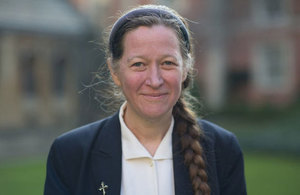Holy See: The moral dimension of work
Our Ambassador Sally Axworthy reflects on the work of Sister Helen Alford in celebration of International Women's Day.

Sr Helen Alford, OP
I met Sister Helen Alford in her office at the Pontifical Angelicum University, where she is Vice Dean of the Faculty of Social Sciences. Sister Helen is a leading expert on the moral dimension of work.
Sister Helen tells me how she became a religious sister. While studying engineering at Cambridge, she read a paper that captured how engineers think about human work. The article started with a mostly automated lightbulb factory, where a few women did repetitive, boring jobs. If engineers had been tasked to get a robot to do one of those tasks, they would have tried to redesign the system to make more use of the robot’s capacities. But they wouldn’t think of doing this when a woman is doing the job. As the author put it: “if engineers could think about people as if they were robots, they’d give them more human work to do”. Helen started to explore these questions, which led her to consider what Catholic social thought said about work. As she did so, she found it harder to share her ideas with other members of the engineering department, but at the Dominican house in Cambridge, she found people who were as interested in these ideas as she was. After working for a short time in the US, she joined the order.
Sister Helen’s field now is the application of religious and ethical traditions (‘wisdom traditions’) to modern social sciences, bringing together Aristotle, Catholic social thought, biology and neuroscience. She a senior adviser to The Blueprint for Better Business, a charity which challenges companies to be a force for good. Helen says that the religious traditions keep alive a biodiversity of ideas (e.g. virtue), that are more or less useful to society at different times.
Sister Helen believes our thinking about work is becoming too constrained by Enlightenment thinking. Economic theories may have been good enough to explain human behaviour in the 1750s, but are too limited to deal with today’s problems. As an example, Helen tells me that much research shows that as income rises, people often become less happy. This might be because money makes us less dependent on our community. For example, the better-off are likely to buy childcare, whereas the less-well-off are likely to source childcare from family members. To overcome this problem, we need to realise how valuable deep relationships are to us, but the idea of the human being as purely individual, as we have inherited it from the Enlightenment, doesn’t help us see that. Religious traditions that were marginalised during the Enlightenment, can help us think about our relationships with the environment and the wider world around us. Sister Helen aims to give businesses resources to solve the problems they face. She pushes them beyond their comfort zones to see that there is no cost hit to being sustainable, and that building trust with customers is good for the bottom line. She tells me that in some parts of the world e.g. India, where there was no Enlightenment process, it is easier to gain traction with some of these ideas, though they have their own problems to deal with.
Sister Helen sees her work as fitting squarely within the traditions of the Dominicans, whose charism (guiding idea) is of an order of preachers, who study and contemplate and then pass on what they’ve learnt to others. The search for truth, Helen says, can mean going beyond current, socially-accepted definitions. The order has a long tradition of going out into the world, with groups of itinerant sisters being established in the 1600s.
Another example, I think, of the religious orders empowering women to have impact in a time when their role was socially constrained. Sister Helen carries on that tradition, pushing at the boundaries of the issues that we face now, and bringing ancient wisdom to help us address the problems of globalisation and inequality.
Sally Axworthy, British Ambassador to the Holy See